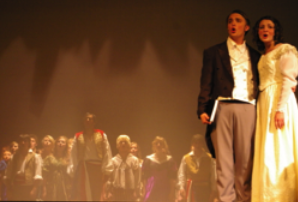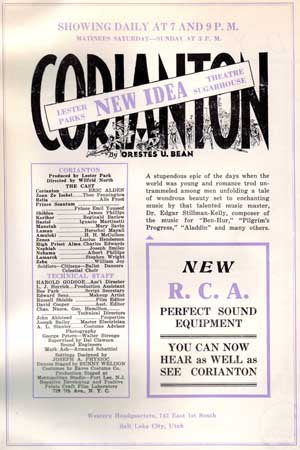Category: Cornucopia
-
Day of the Dead, Lord of Life
cross posted at Civil Religion “Death be not proud,” taunted John Donne. “One short sleepe past, wee wake eternally, / And death shall be no more; death, thou shalt die.” Death interrupts our view of eternity, a fearsome jalousie obscuring a future we must approach. Like Donne, we console and distract ourselves by turns with…
-
St Louis Mormon Historical Society meets Friday
Trivia fact for the day: the Mormon church operated a newspaper, the St. Louis Luminary, from November 1854 to December 1855. The periodical served the large community of transient Latter-day Saints, many of whom stopped in St Louis to replenish their strength (and funds) after the first leg of their journey to the Salt Lake…
-
The Dispensation of the Fulness of Times®
So the upcoming RS/MP lesson got me thinking: What exactly does the phrase “the dispensation of the fulness of times” actually mean?
-
The Nasty Side of Christian Ethics
The language of turning the other cheek and Christian ethics in general can really get quite nasty.
-
Human life, religious voices and the public square
Cross-posted at Civil Religion. Last week the New York Times published a two–part series on artificial reproductive technologies. The series makes a riveting read, as writer Stephanie Saul narrates the joys and terrors of premature birth, high order multiples, NICU stays, and—finally, sometimes—the precious goal, a baby at home with a family.
-
MR: “Music From Across the Divide”
A new issue of The Mormon Review is available, with a review of the music of Sara Groves by Troy Keller. The article is available at: Troy Keller, “Music From Across the Divide,” The Mormon Review, vol.1 no. 7 [HTML] [PDF] For more information about MR, please take a look at the prospectus by our…
-
Christian Neighbors
When my neighbor four-doors-down called last night and asked if I could take dinner to my neighbor three-doors-down, I said yes. I’m a Mormon mom: dinner for a single, middle-aged man is no problem. It was the circumstances that made me pause.
-
John Alvon Glauser: Face to Face with History
Michelle Glauser is a young Mormon American woman living in Germany. I’ve long read her blog, Circles and Dots and Other Distractions, which is a riot of activity — she may be based in Leipzig, but she’s just as apt to be blogging about her trip through Turkey, or Switzerland, or Poland, as she is…
-
Conference Traditions
My son was none-too-thrilled to realize last night that by next General Conference he will be twelve and *get* to go to a two-hour meeting with his dad. We thought that reviving my husband’s tradition
-
Diapers, Dishes, and Dusting
Yesterday, a Mormon Times article began with this opener: “For Finnish music star Mervi Hiltunen-Multamäki, trading in exotic concert locales, a prime-time TV show and platinum records for diapers, dishes and dusting was an easy decision. Maybe that’s because following the prophet has never been hard for her.”
-
The Songs of Lehi
If we accept, at least for the moment, that 1 Nephi has a textual history, that it drew on older sources or underwent expansion at various times, then we might wonder what could be considered the oldest layer of the text
-
MR: “The Romance of Materialism: Notes on Hitchcock’s Vertigo”
A new issue of The Mormon Review is available, with a review of Alfred Hitchcock’s movie “Vertigo” by Joseph M. Spencer. The article is available at: Joseph M. Spencer, “The Romance of Materialism: Notes on Hitchcock’s Vertigo,” The Mormon Review, vol.1 no. 6 [HTML] [PDF] For more information about MR, please take a look at…
-
The Downstream Principle of Language
I’m posting this at Times and Seasons as follow-up to a three-part series I wrote here a couple years back (see here, here and here). I’ve cross-posted it over at A Motley Vision’s companion blog Wilderness Interface Zone. September 17th marked the two-year anniversary of the closing of Crossfire Canyon (real name: Recapture Canyon) to…
-
The textual tectonics of 1 Nephi
My basic problem with Blake Ostler’s expansion theory is that it approaches via intellectual history what is at heart a problem in textual history
-

My Teen Swears in the Name of Art
They immersed themselves in the characters and, by so doing, opened the door to deeply significant conversations between the cast, their parents, and the community. Artistic explorations have the power to touch us deeply, in ways that detached discussion about concepts cannot.
-
Joseph Smith Papers Book Signing – October 1
This new volume is the second overall in the Joseph Smith Papers, but is the first of the Revelations and Translation series which will provide transcripts of many of the earliest manuscripts of Joseph Smith’s written revelations and translations…
-
MR: “Exaltation and the Lost Symbol”
A new issue of The Mormon Review is available, with a review of Dan Brown’s new novel The Lost Symbol by Scott Holley. The article is available at: Scott Holley, “Exaltation and The Lost Symbol,” The Mormon Review, vol.1 no. 5 [HTML] [PDF] For more information about MR, please take a look at the prospectus…
-

Corianton – An Unholy Review
Short review of Corianton: By today’s standards, it wasn’t a very good movie. But by 1931 standards? Well, it wasn’t a very good movie.
-
Let Them Praise His Name in the Dance!
I went on one of the best dates I’ve been on in some time tonight – my daughter and I went to BYU’s World of Dance.
-
Religion as Friendship
Yesterday in Elders Quorum I taught Lesson 40: “How Glorious are Faithful, Just and True Friends.” It was a lot of fun — it’s a great set of discussion materials. Today, I read a fascinating article in the New York Times about the science of human friendship and connection. I love the idea of Zion…
-
MR: “The Redemption of Eve: Joseph Smith and Goethe’s Faust”
A new issue of The Mormon Review is available, with an essay on Goethe’s Faust by Terryl Givens. The article is available at: Terryl Givens, “The Redemption of Eve: Joseph Smith and Goethe’s Faust,” The Mormon Review, vol.1 no. 4 [HTML] [PDF] For more information about MR, please take a look at the prospectus by…
-
The formula for Nephi
In How to Kill a Dragon, the Indo-Europeanist Calvert Watkins defines formulas as “set phrases which are the vehicles of themes.”
-
Sportsmanship dead at BYU?
Writing about the punch after the Boise State-Oregon game, Gene Wojciechowski at ESPN notes, (emphasis added) Sportsmanship isn’t dead in Football Bowl Subdivision programs, but it’s on a respirator. I covered the Minnesota-Syracuse game Saturday, then watched large chunks of the Charleston Southern-Florida, BYU-Oklahoma and Alabama-Virginia Tech games. On Monday night I watched the Miami-Florida…
-

MR: “Eliade’s Return”
A new issue of The Mormon Review is available, with a review of Mircea Eliade’s The Myth of the Eternal Return by Richard Lyman Bushman. Eliade is a major scholar of religious studies, and his ideas regarding sacred space and sacred time have been hugely influential on how two generations of Mormon intellectuals have thought…
-
Walk and not faint
According to scripture, what ought one do in order to run and not be weary, walk and not faint? That’s easy, right. The answer is set out in plain view, in the Book of Isaiah. Wait — Isaiah?
